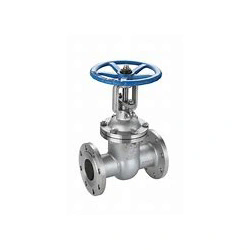Flange Gate Valve: Reliable Flow Control for Industrial Piping Systems
2025-05-29
A Flange Gate Valve is a widely used valve type in industrial piping systems, designed to control the flow of liquids, gases, or steam by lifting a gate out of the flow path. Known for its robust construction and effective sealing, flange gate valves are essential components in sectors such as oil and gas, water treatment, chemical processing, and power generation.

What Is a Flange Gate Valve?
A flange gate valve features two flanged ends for bolted connection to a pipeline, ensuring a secure and leak-proof joint. The valve operates by raising or lowering a wedge-shaped gate inside the valve body, which either allows or blocks flow. This valve type is ideal for on/off service rather than throttling, providing minimal flow resistance when fully open.
Key Features
1. Flanged Connections
The flanged ends enable easy installation and removal, providing strong mechanical support and reliable sealing with gasket material between the flange faces.
2. Full Bore Design
When fully opened, the gate retracts completely, allowing fluid to flow freely with negligible pressure drop.
3. Rising or Non-Rising Stem Options
The stem can either rise visibly as the valve opens, providing clear indication of valve position, or remain non-rising for space-saving installations.
4. Durable Construction
Typically made from cast steel, stainless steel, or ductile iron, flange gate valves are built to withstand high pressure, temperature, and corrosive environments.
Advantages of Flange Gate Valves
Tight Sealing: The gate provides a positive seal, minimizing leakage in both directions.
Low Pressure Loss: Full bore design ensures smooth flow and minimal turbulence.
Easy Maintenance: Flanged connections simplify valve removal for inspection or repair.
Wide Range of Sizes: Available from small diameters to large industrial pipes.
Versatile Applications: Suitable for liquids, gases, and steam in diverse industries.
Typical Applications
Oil and Gas Industry: Controlling crude oil, natural gas, and refined products in pipelines.
Water Treatment Plants: Managing flow in water distribution and wastewater systems.
Chemical Processing: Handling corrosive or hazardous chemicals safely.
Power Plants: Regulating steam and cooling water lines.
Marine Industry: Used in shipboard piping for ballast, fuel, and water systems.
Installation and Operation Tips
Ensure proper alignment of flanges and use suitable gasket materials to prevent leaks.
Operate the valve fully open or fully closed to avoid gate damage.
Periodically inspect and lubricate the stem and gate for smooth operation.
Follow manufacturer guidelines for pressure and temperature ratings.
Conclusion
The Flange Gate Valve is a dependable, efficient, and widely adopted solution for controlling flow in piping systems. Its robust flanged connection, effective sealing, and minimal flow resistance make it an ideal choice for demanding industrial environments. Whether in oil pipelines or water treatment plants, flange gate valves provide reliable performance that ensures system integrity and operational safety.


